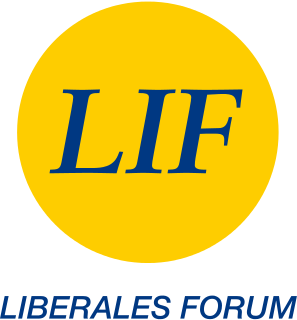
The politics of Austria take place in the framework of the federal parliamentary republic of Austria, with a President as head of state, and a Chancellor as the head of government. Governments, both local and federal, exercise executive power. Federal legislative power is vested both in the Federal Government and in the two chambers of Parliament; the National Council and the Federal Council. The Judiciary of Austria is independent of the executive and the legislature.

Franz Vranitzky is an Austrian politician. A member of the Social Democratic Party of Austria (SPÖ), he was Chancellor of Austria from 1986 to 1997.
Karin Gastinger is an Austrian politician. She was Federal Minister of Justice in the coalition government led by Wolfgang Schüssel which served from June 2004 to January 2007.

The Lower Austrian state election of 2008 was held in the Austrian state of Lower Austria on 9 March 2008. They were contested by the Austrian People's Party, the Social Democratic Party of Austria, The Greens – The Green Alternative and the Freedom Party of Austria, all of whom are in the current Landtag, and a number of smaller parties.

Local elections were held in Graz on 20 January 2008. Apart from the five parties present in the municipal council – the Austrian People's Party, the Social Democratic Party of Austria, the Communist Party of Austria, the Freedom Party of Austria and the Greens – The Green Alternative – the Alliance for the Future of Austria also contested the election.

Snap legislative elections were held in Austria on 28 September 2008 to elect the 183 members of the National Council. The elections were caused by the withdrawal of the Austrian People's Party (ÖVP) from the governing grand coalition with the Social Democratic Party on 7 July 2008. Due to dissatisfaction with the grand coalition and the two main parties, it was widely expected to be a realigning election, with gains for the opposition and up to seven parties were expected to win seats.
The political parties used numerous campaign posters in the 2008 Austrian legislative election.

The Carinthian state and municipal elections of 2009 were held in the Austrian state of Carinthia on 1 March 2009. Carinthia is the stronghold of the national conservative Alliance for the Future of Austria, whose founder Jörg Haider died in a car accident on 11 October 2008. He was also the incumbent governor; after his death, he was replaced by Gerhard Dörfler as governor, by Uwe Scheuch as Carinthian BZÖ leader and by his close personal friend Stefan Petzner as national BZÖ leader. The election is likely to see a strong contest between the SPÖ and the BZÖ over the post of governor, while the other Austrian parties play only a minor role in Carinthian politics.

The Freedom Party of Austria is a right-wing populist and national-conservative political party in Austria. The party, led by Heinz-Christian Strache, is a member of the Europe of Nations and Freedom group in the European Parliament, as well as of the Movement for a Europe of Nations and Freedom.

Legislative elections were held in Austria on 29 September 2013.
This article covers the formation of the Faymann cabinet following the 2008 parliamentary election in Austria.
A legislative snap election for the National Council in Austria was held on 28 September 2008. The previous election was held on 1 October 2006. The election was caused by the withdrawal of Austrian People's Party leader Wilhelm Molterer from the governing grand coalition on 7 July 2008. Due to dissatisfaction with the grand coalition and the two main parties, it was widely expected to be a realigning election, with gains for the opposition and up to seven parties expected to be in the National Council after the election. The losses for the government parties resulted in strong gains for the far right, while neither the Liberal Forum nor the Citizens' Forum Austria gained as much as 2% of the vote, defying earlier expectations. The result of the election was seen as strong for the far-right and in support of Eurosceptics.

The Social Democratic Party of Austria is a social-democratic political party in Austria and alongside with the People's Party one of the country's two traditional major parties.
A legislative snap election for the National Council in Austria was held on 28 September 2008. The previous election was held on 1 October 2006. The election was caused by the withdrawal of Austrian People's Party leader Wilhelm Molterer from the governing grand coalition on 7 July 2008. Due to dissatisfaction with the grand coalition and the two main parties, it was widely expected to be a realigning election, with gains for the opposition and up to seven parties expected to be in the National Council after the election. The losses for the government parties resulted in strong gains for the far right, while neither the Liberal Forum nor the Citizens' Forum Austria gained as much as 2% of the vote, defying earlier expectations. The result of the election was seen as strong for the far-right and in support of Eurosceptics.
A legislative snap election for the National Council in Austria was held on 28 September 2008. The previous election was held on 1 October 2006. The election was caused by the withdrawal of Austrian People's Party leader Wilhelm Molterer from the governing grand coalition on 7 July 2008. Due to dissatisfaction with the grand coalition and the two main parties, it was widely expected to be a realigning election, with gains for the opposition and up to seven parties expected to be in the National Council after the election. The losses for the government parties resulted in strong gains for the far right, while neither the Liberal Forum nor the Citizens' Forum Austria gained as much as 2% of the vote, defying earlier expectations. The result of the election was seen as strong for the far-right and in support of Eurosceptics.

Legislative elections were held in Austria on 15 October 2017. The Austrian People's Party (ÖVP) emerged as the largest party in the National Council, winning 62 of the 183 seats. The Social Democratic Party (SPÖ) finished second with 52 seats, slightly ahead of the Freedom Party of Austria (FPÖ), which received 51 seats. NEOS finished fourth with 10 seats, and PILZ entered parliament for the first time and came in fifth place with 8 seats. The Green Party failed to cross the 4% threshold and was ejected from parliament, losing all of its 24 seats.






















